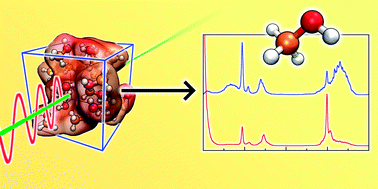
Computational chemistry is a two-headed scientist, where one head is constantly trying to find cost-effective methods for screening molecular interactions, lock-and-key matches of drug candidates etc. While the other head is busy creating a theoretical model able to emulate nature as close as possible. Either head is plagued by the need to understand nature and benchmark against experimental data. The computational results must constantly be contrasted to experiments, as not to lose the contact with reality and be caught in the virtual world. This is highlighted in the excellent report by Vöhringer and Kirchner on the computing of vibrational spectra.
Martin Thomas and co-workers makes a thorough review of the field of calculating vibrational spectra, followed by an easily approached walk-through of the theory they use when generating vibrational spectra from MD simulations. Reading the paper, I must admit I gained high expectations as to the results. I have been away from the field a couple of years. So instead of the being impressed by the results, I was slightly disappointed, which is completely unfair. Not only does the work move from the static system and the harmonic approximation, it also takes us from the gas phase to solvated molecules. Well, the experimental data is not matched, but we are getting closer.
by Dr Thomas Just Sørensen
Read more details of this fascinating article which is part of the themed collection “Theory meets spectroscopy“:
Computing vibrational spectra from ab initio molecular dynamics
Martin Thomas, Martin Brehm, Reinhold Fligg, Peter Vöhringer and Barbara Kirchner
DOI: 10.1039/C3CP44302G










